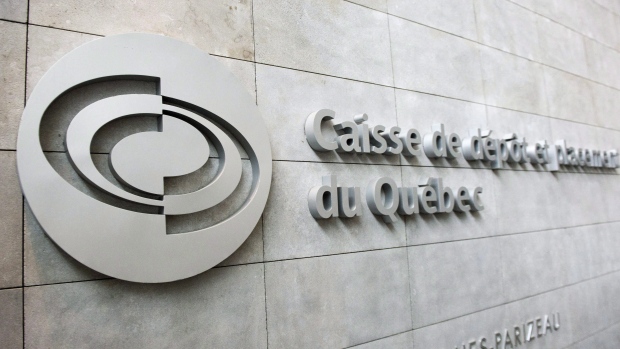Jan 29, 2020
Banking veteran Charles Emond appointed next CEO of Quebec's Caisse de depot
, Bloomberg News

Caisse de Depot et Placement du Quebec picked an insider and banking veteran to lead Canada’s second-largest pension fund manager in an era of low-interest rates and trade tensions.
Charles Emond, who oversees private equity and the fund’s investment strategy in Quebec, will start as chief executive officer and president on Feb. 1, the Montreal-based Caisse said on Wednesday. He is taking over from Michael Sabia, 66, who oversaw a near tripling of assets to more than $326 billion and pushed into overseas markets and climate-conscious investing during his 11-year tenure.
“I want to continue building this organization to firmly position it to face the major challenges of our time, including developing our economy for tomorrow and investing sustainably while generating returns for our depositors in the future,” Emond said in a statement.
Emond, who worked at Bank of Nova Scotia for almost two decades before joining the Caisse last year, represents the latest shift in the changing of the guard at Canadian pension funds. Blake Hutcheson will take over as the new head of Ontario Municipal Employment Retirement System in June, following the appointment of Jo Taylor as the head of Ontario Teachers’ Pension Plan, who succeeded Ron Mock who retired Jan. 1.
Tasked with a rare twin mandate of generating optimal returns while contributing to Quebec’s economic development, the new CEO will need to navigate the geopolitical risks that have roiled markets --from U.S. tensions with China and Iran to the coronavirus--as well as the intricacies of provincial politics. His appointment was vetted by the government.
Scotiabank Background
Lower-for-longer interest rates have pushed pension funds and asset managers to cast their nets far and wide in search for returns. Emond inherits an institution that has 64 per cent of its funds invested in global markets, against 36% when Sabia took over in 2009.
That diversification, combined with investments in low volatility assets such as private equity and real estate, helped drive annual returns of 9.9 per cent over the past 10 years.
Emond, who led Scotiabank’s 2018 acquisition of Jarislowsky Fraser Ltd., joined the Caisse about a year ago and was given increased responsibilities in November. While independent, he will need to define a working relationship with the nationalist government of Premier Francois Legault, who has vowed to increase wealth in the province of 8.5 million and preserve head offices.
In a May interview with La Presse, Emond said the institution’s dual mandate was “an interesting challenge.” Protecting head offices doesn’t just happen defensively at the time of a transaction, but also offensively when helping local companies expand or modernize, he said.
Unique Role
As a shareholder in a slew of Quebec-based companies, La Caisse can be a key player in the economic landscape. Last year it publicly lost patience with struggling engineering company SNC-Lavalin Group Inc. The fund’s 30% stake in ailing Bombardier Inc.’s train unit could prove decisive for the company as it considers asset sales. Emond has a seat on the unit’s board.
The Caisse plays a unique role in Quebec, where many feel ownership of the institution that manages their savings. It was set up by the government in 1965, during a period of deep changes known as “the quiet revolution” that saw the province take steps to gain greater autonomy on everything from education to natural resources.
In a November speech, Sabia shared that people regularly walk up to him at the grocery store or at restaurants to thank him. But the Caisse is under close scrutiny by politicians and local media, including on its recent efforts to design, build and operate a public transit system for the first time -- a light rail in Montreal.
Sabia is leaving to head up the Munk School of Global Affairs and Public Policy at the University of Toronto.
“In Quebec, the Caisse president is almost a public persona,” said Michel Magnan, a Concordia University professor in Montreal who specializes in governance. “There’s a political dimension to the job.”



